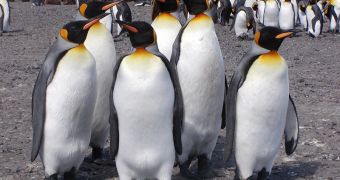Penguins have turned into a symbol of the fight to protect the pristine Antarctica against contamination and overexploitation.
But their abilities and ecology have made them a good tool for the scientific research of the effects of the global warming.
They can dive hundreds of meters into the dark, icy waters of the Southern Ocean where they spend weeks on hunting fish expeditions.
Warming seas and overfishing in the waters off Antarctica are affecting marine stocks, from microscopic plankton to killer whales.
Measuring this with traditional methods in these waters can result extremely costly and ineffective.
"The Southern Ocean is so vast that it's very difficult and expensive to sample with any validity using boats and fishing nets," said Dr Lewis Halsey, lead researcher of the penguin project developed by a team from Birmingham University's School of Biosciences.
"So why not recruit a natural-born swimmer with good local knowledge to do the job?"
King penguins live in the subantarctic islands and breed during the winter.
In the summer, they go on a lengthy hunting expedition to find food.
"You can get to them easily on land, equip them cheaply with a data-logging chip, and off they go into the ocean, leading us to the fish. King penguins are large and numerous, so they have a significant role in the ecosystem - effects felt by them will be felt by everything else." said Hasley.
The team worked with penguins in a colony from the Crozet archipelago, a French territory located about halfway between Madagascar and Antarctica.
On Crozet there are huge colonies of penguins, seals and albatrosses, and a permanent research station where the team lives for up to five months yearly.
"While it's very rugged and can be very windy, there isn't always snow and it can even get quite warm in the summer. It's also a perfect place to gain access to penguins and work with them in a controlled environment." said Halsey.
The team measured the energy spent by king penguins to hunt for their favorite food item, the lanternfish.
If the penguins work harder to locate the fish, this means there are less fish stocks in the ocean.
The energy expenditure was measured on 50 individuals who were implanted with abdominal smart-tags.
The devices assess the temperature at the back of the bird's throat, as swallowing a cold fish determines a temporary drop, and this way the researchers know how many fish the penguin ate.
The tags also had a hydrostatic sensor assessing pressure, which increases by one atmosphere with 10 m (30 ft) of depth and if the lanternfish are in low quantities, the birds have to dive as deep as 350 m (1,160 ft).
The chip also monitors the bird's pulse, which rises from a sedentary 30 beats a minute to 200 beats a minute while hunting in the water.
The heartbeats were correlated to oxygen consume (thus energy waste).
The data indicated that king penguins are now working harder to get less food.
This points that overfishing and the warming waters in the Southern Ocean are forcing lanternfish deeper and further south, with huge implications for the ecological balance.
Penguins are now increasingly relying on squid.
"You can't get as much energy from squid as you can from fatty, oily lanternfish. This means they have to eat more to make up the calories, which requires even more energy and takes more biomass out of the ocean, and that has knock-on effects on other species that rely on squid." said Halsey.
"If fishing and the warming of the seas goes on at this rate, it could result in reduced breeding success, which would be a tragedy."

 14 DAY TRIAL //
14 DAY TRIAL //